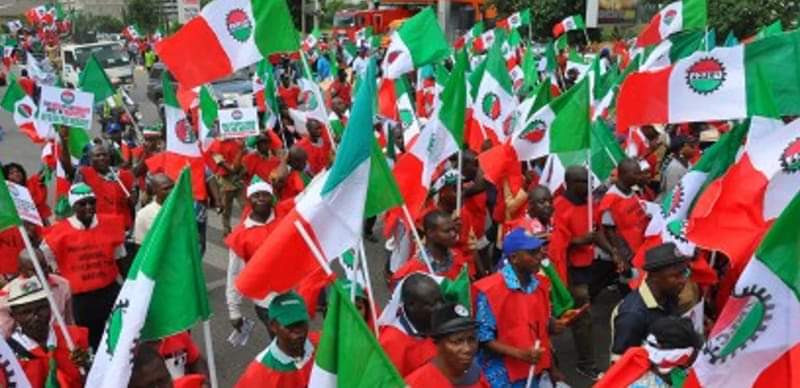•Ultimatum given by NLC, TUC applicable to states – Kano, Gombe NLC chapters, others
•15 million households to get N25,000 monthly, programme will reduce poverty, says W’Bank

Organised Labour has issued a two-week deadline to governors to commence negotiations on the N35,000 wage award for workers in their states in line with the terms of the Memorandum of Understanding signed by the Federal Government, the Nigeria Labour Congress and the Trade Union Congress.
The state chapters of the NLC and TUC, which handed down the ultimatum on Tuesday, said they had written to the governors to fast-track the necessary protocols and implement the award meant to assuage the subsidy removal pains.

The unions pointed out that the deadline for payment of the wage award would expire in the next two weeks, and they asked the governors to begin the implementation process.
This came as President Bola Tinubu Tuesday inaugurated the N1tn cash transfer programme to 15 million households to cushion the economic shocks of the fuel subsidy.

Each household will receive N25,000 for three months. With 15 million households getting N25,000 each for three months, about N1.13tn will be spent on the programme.
At the event, the Minister of Humanitarian Affairs and Poverty Alleviation, Dr Betta Edu, said about 61 million Nigerians would benefit from the cash transfer.
The national leadership of the NLC and TUC had on October 1 reached an agreement with the FG to pay N35,000 to all federal workers beginning from September, pending when a new national minimum wage is expected to have been signed into law.
The resolution provided that the wage award would be paid to the federal workers for six months while states were encouraged to extend the same benefit to their workers.
The PUNCH reports that Labour had threatened to declare a nationwide strike on October 3 but the move was suspended with the caveat that the wage award, cash transfer, and some other resolutions must be implemented within 30 days effective from the day the MoU was signed.
The Kano State NLC Chairman, Kabiru Inuwa, revealed he had written to the state government to demand the immediate implementation of the N35,000 wage award in the state.
“We have written to the government requesting for the payment of the wage award to workers in the state and we are still waiting for the government to respond,” Inuwa said, noting that the deadline given by the NLC to the federal and state governments to implement the wage award and other welfare packages for the workers would soon expire.
He expressed the hope that the state government would pay the wage award before the expiration of the deadline.
“The ultimatum given to both state and federal governments will expire by the end of this month, so we hope the government will start the payment before the end of the deadline,” Inuwa said.
On his part, the Gombe State NLC Secretary, Ibrahim Fika, in an interview with The PUNCH, said the 30-day ultimatum, which is now remaining two weeks, applied to workers in state governments. He said, “The ultimatum says the state councils should negotiate with the state government. So it applies to us.’’
Rivers TUC
In Rivers State, the TUC said it would fully comply and implement the ultimatum given to the Federal Government by organised labour.
The state TUC Chairman, Ikechukwu Onyefuru, stated this while speaking with our correspondent in Port Harcourt on Tuesday.
He stated, “State unions are subject to national directives and the 30-day ultimatum was issued by the national body to the Federal Government and directed all state chapters to also issue demands to their respective state governments and implement the same.
“This means that if any state peradventure decides to jettison that directive, such a state is already in breach of the national directive.
“So what I am saying is that it is a national directive, and the respective states have been served and it is expected that they will respond.’’
The Chairmen of the NLC and TUC in Benue State, Terungwa Igbe and Gideon Akaa, disclosed that they had written to the state governor on the wage award for workers.
Speaking separately to our correspondent, Igbe and Akaa explained that the state government had yet to respond to their letter.
Igbe said, “The union has written to the state government about the wage award, and we asked for N35,000. But we have yet to receive a response from the government. Well, I cannot say for now what we will do if the government fails to pay; it all depends on their response.’’
Responding to inquiries from The PUNCH, Aka said, “The two unions, NLC and TUC, wrote a joint letter to the governor that they should implement the N35,000 wage award to Benue workers of both the state and local government areas last week.’’
He expressed optimism that the state would implement the wage award.
Asked about the union’s next steps if the governor failed to respond, Aka noted, “Let us not pre-empt them because the adviser to the governor on Labour promised to talk to the governor so we can have an interface.’’
In Sokoto, the state chapter of the NLC disclosed that it had opened discussions with the state government over the package.
The secretary of the union, Hamisu Yanduna, explained that the leadership of the NLC in the state was expected to hold a meeting with the governor any time this week.
Similarly, in Ogun, Labour has commenced negotiations on the payment of the wage award with the state government.
Speaking with our correspondent on Monday, the TUC Chairman, Akeem Lasisi, said, “Even when other state governments have folded their arms waiting for the outcome of the national engagement with organised labour, the Ogun State Government invited us four days after the removal of the subsidy to have common fronts on how to cushion the effect.
“The outcome of the engagement is the release of a 14-item palliative measure, among which is the payment of N10,000 in the first instance for the first three months of July, August, and September, which we are sure would be increased from October.’’
Speaking further, he stated, “By the agreement with the Federal Government, Ogun State Government has also commenced, among others, the payment of 40 per cent of the basic salary as palliatives to cushion the effect of removing the subsidy.
“Already, we have written a letter to the government on the need to review the wage award given to workers in the state, and we have also met with the Head of Service and the Accountant-General to inform them of the readiness of the Labour leaders to discuss with government and we hope for the best.’’
The state NLC Chairman, Hameed Ademola, confirmed that the unions would soon meet with the governor on the implementation of their demands.
“Yes, we have written to the state government on this component of the salary review agreement, calling for the implementation of this component. The letter has been dispatched.
“We have followed it up with a visit to the Secretary to the State Government, Mr Talabi Tokunbo, last Friday and we have been assured that the letter is on the table of Mr Governor. We hope we shall meet the governor this week and iron out other issues besides the salary increment.”
The labour unions in Katsina State said they were also expecting the government’s response to their demand for a meeting with Governor Dikko Radda to discuss the welfare of the workers in the state.
Giving an update on their request, the state TUC Chairman, Muntari Ruma, said, “Yes, we have written to the state government and anytime from now, we will be invited. So, it is better to wait until we have the meeting before discussing the issue further.”
The NLC Chairman, Husseini Hamisu, affirmed that the unions would demand a comprehensive welfare package from the governor.
“We have written to the state government and I am quite sure that before the week runs out, there will likely be a meeting. We are discussing a comprehensive package and not only the wage issue. We shall keep you posted,’’ he added.
Further findings showed that the state government may constitute a committee to address Labour’s demands.
Credible sources revealed that the committee might be constituted anytime from now.
The Director-General of media, Maiwada Dammallam, could not be reached for comments on Monday.
But the Niger State NLC chairman, Idrees Lafene, stressed that workers might demand more than N35,000 from the state government given the spike in the cost of living.
He disclosed that discussions had gone far on the wage award implementation, and they were optimistic that the government would yield to their demands.
“Yes, we’re still on the negotiation table and we are asking for more; we’re asking for more than N35,000 and the discussion has gone far,’’ he stated.
Asked what would happen should the state fail to heed the union’s demand, Lafene replied, “You are pre-empting what will happen. Let it happen first.”
Following the delay in the award payment, the Ondo State chapter of the TUC said the unions had written a joint letter to the government.
The state Chairman of the TUC, Mr Clement Fatuase, said, “The government has not started paying the money in Ondo State and we have written to them on the matter but up till now, nobody called us.’’
Also, the unions in Osun, Kwara, Kebbi, Bayelsa, and Delta states have made overtures to the authorities on the payment of the wage award to cushion the pains of fuel subsidy removal.
Sources in the Osun State labour movement said formal negotiations had yet to commence between the state government and the labour leaders.
The TUC Chairman, Abimbola Fasasi, confirmed that negotiations had not started on the workers’ demands.
He said, “We have not formally commenced negotiation with the government on the N35,000 wage award, but meetings have been held, but not formally.”
The national leadership of the NLC and TUC could not be reached for comments on Tuesday on the delay in negotiation of the wage award in states, but the National Deputy President of the TUC, Tommy Etim, had earlier told The PUNCH that they would call out their members on an indefinite strike without warning if the government failed to implement the MoU within the stated timeframe.
‘’The 30-day ultimatum we gave to them is still in place. We have given them time and we are sure they are working. What we did was just a suspension. When you suspend a strike, you can kick-start it without further notice. We have done our part and are waiting for them to play their part,’’ he stated.
Cash transfer
In line with his administration’s plan to ameliorate the hardships in the country, President Tinubu has begun the conditional cash transfer initiative by presenting symbolic dummy cheques to the first set of beneficiaries in Abuja.
He presented cheques of N25,000 each to five beneficiaries: Larai Suleiman, Shuaibu Hassana, Sariki Gamu, Okor Jonah, and Hameed Isiaka.
“I hereby flag off the Renewed Hope conditional cash transfer programme for 15 million households targeted at uplifting poor and vulnerable Nigerians as an immediate intervention to cushion the effects of fuel subsidy removal and other economic shocks,” Tinubu told guests and international partners who converged on the Press Gallery of the State House, Abuja, for the ceremony.
The conditional cash transfer is among 15 items in the MoU between the Federal Government and the Organised Labour signed on October 1.
Speaking on Tuesday, which is also the International Day for the Eradication of Poverty, Tinubu, who was represented by the Secretary to the Government of the Federation, George Akume, said his administration was “partnering the World Bank Group and other development partners to implement conditional cash transfers, business grants and other forms of support for the most vulnerable households via the National social safety net expansion programme.”
Tinubu stated, “The theme of this year’s commemoration, ‘Decent Work and Social Protection: Putting dignity in practice for all,’ is undoubtedly in perfect alignment with the Renewed Hope agenda.
“My government will lead from the front to ensure that all Nigerians have decent opportunities for dignified work and sustained social protection.”
However, he said the government was working to develop and deploy several more solutions and interventions to help Nigerians of all walks of life.’’
The Minister of Humanitarian Affairs and Poverty Alleviation, Dr Betta Edu, said 61 million Nigerians would benefit from the scheme every month in October, November, and December.
She said, “So, in total, 15 million households will receive N75,000 over three months. This equates to about 61 million Nigerians directly benefiting from the conditional cash transfer.
“Why do we call it conditional cash transfer? And what really can it do for Nigerians? If we are sincere with ourselves and as a country, we all must put our hands together to make progress.
“We must recognise that indeed there is a need for that urgent intervention to Nigerians’ need to feel the renewed hope agenda N75,000.”
Edu said beyond the cash transfers, the FG would provide “low-cost shelter for the poor and internally displaced persons as a form of providing that cover for them.
“Several other interventions, including the Rural Vocational Skills Intervention, will be carried out at a mass scale. All of these are targeted at the various dimensions of poverty in the country.”
Minister of Finance and Coordinating Minister of Economy, Mr Wale Edun, said the 63 per cent of Nigerians living in poverty was unacceptable to President Tinubu.
“Clearly, to Mr President, it is unacceptable as it is to the rest of us. And that is why it is, perhaps, his number one priority- tackling poverty, and he has a programme to stabilise the economy and grow it in general,” said Edun.
Meanwhile, the World Bank country representative, Shubham Chaudhuri, confirmed that cash transfers were widely applicable to reducing poverty.
Chaudhuri noted that the method was one of the most effective in assisting citizens, particularly the impoverished and vulnerable, impacted by economic shocks or rising living costs.
“This aid is crucial in helping them overcome the initial period during which they might otherwise be compelled to make decisions with long-term consequences.
“For instance, these decisions might include reducing daily meals to just one or withdrawing their children from school.
“The type of cash transfer referred to as ‘shock-responsive cash transfer’ currently being implemented is utilised by countries worldwide to offer temporary relief in such situations,’’ he concluded.

